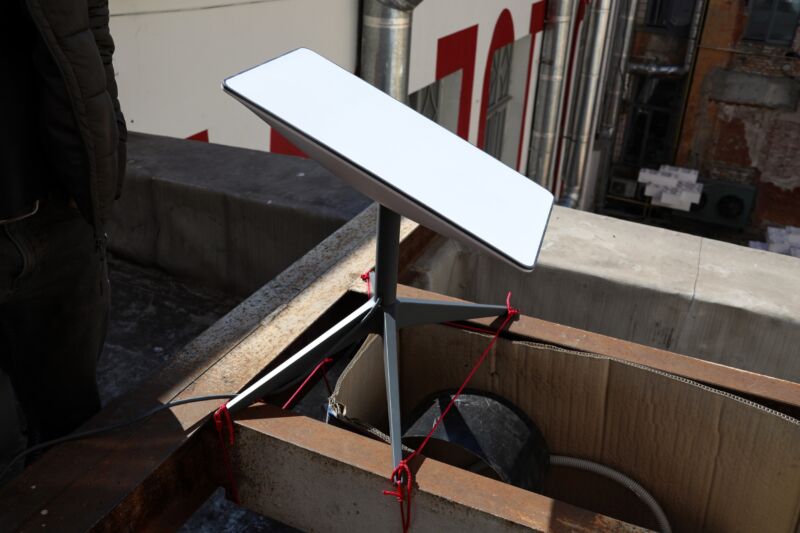
SpaceX has asked the Pentagon to fund the Ukraine government and military’s use of Starlink broadband, saying the Elon Musk-led company can’t afford to donate more user terminals or pay for operations indefinitely, CNN reported.
“We are not in a position to further donate terminals to Ukraine, or fund the existing terminals for an indefinite period of time,” SpaceX’s director of government sales wrote to the Pentagon in a September letter, according to CNN. The letter “requested that the Pentagon take over funding for Ukraine’s government and military use of Starlink, which SpaceX claims would cost more than $120 million for the rest of the year and could cost close to $400 million for the next 12 months.”
Musk defended the request today. “SpaceX is not asking to recoup past expenses, but also cannot fund the existing system indefinitely and send several thousand more terminals that have data usage up to 100X greater than typical households. This is unreasonable,” he wrote on Twitter.
The CNN article said that “roughly 20,000 Starlink satellite units have been donated to Ukraine” and that the Ukraine military asked for 8,000 more in July.
Musk: Operation has cost SpaceX $80 million
SpaceX’s Starlink division sent satellite terminals to Ukraine after Russia’s invasion of the country disrupted broadband networks, and the Internet access has been useful in Ukraine’s military operations against Russian forces. The US initially provided $3 million for the effort.
Musk wrote last week that “only a small percentage” of Starlink terminals and service were paid for by outside sources and that the “operation has cost SpaceX $80M & will exceed $100M by end of year.”
According to CNN’s article, the SpaceX letter to the Pentagon said “about 85 percent of the 20,000 terminals in Ukraine were paid—or partially paid—for by countries like the US and Poland or other entities. Those entities also paid for about 30 percent of the Internet connectivity, which SpaceX says costs $4,500 each month per unit for the most advanced service.”
The $4,500-per-month figure seems to refer to the typical fee for that tier of service, rather than to SpaceX’s actual costs to provide it.
“SpaceX says it has paid for about 70 percent of the service provided to Ukraine and claims to have offered that highest level —$4,500 a month—to all terminals in Ukraine despite the majority only having signed on for the cheaper $500 per month service,” CNN wrote. “The terminals themselves cost $1,500 and $2,500 for the two models sent to Ukraine, the documents say, while consumer models on Starlink’s website are far cheaper and service in Ukraine is just $60 per month.”
SpaceX request “rankled” Pentagon brass
The funding request seems to have triggered a conflict between SpaceX and the Pentagon. “SpaceX’s request that the US military foot the bill has rankled top brass at the Pentagon, with one senior defense official telling CNN that SpaceX has ‘the gall to look like heroes’ while having others pay so much and now presenting them with a bill for tens of millions per month,” CNN wrote.
The Pentagon took a more measured tone publicly. “I can confirm that the department has been in communication with SpaceX regarding Starlink,” Pentagon deputy press secretary Sabrina Singh said, according to the Financial Times. “We’re working with our partners and allies trying to figure out what’s best.”
“There are certainly other Satcom capabilities that exist out there,” she also said. “There’s not just SpaceX, there are other entities that we can certainly partner with when it comes to providing Ukraine with what they need on the battlefield.”
On October 3, after Musk wrote a controversial tweet proposing terms for a Ukraine-Russia peace, Ukrainian diplomat Andrij Melnyk told Musk to “fuck off.” While SpaceX’s letter to the Pentagon was sent months before that Twitter exchange, Musk today replied to a journalist who suggested the funding request and Melnyk’s tweet to Musk were connected. “We’re just following his recommendation,” Musk wrote.
Melnyk’s Twitter profile says he is Ukraine’s ambassador to Germany. But he was fired from that post in July, “a week after the diplomat gave an interview in which he defended the legacy of a World War II nationalist leader who collaborated with the Nazis,” The New York Times reported at the time.
Some Ukrainians pay for Starlink themselves
Amid the funding conflict, some Ukrainians tweeted about how they and Ukraine soldiers have been paying for Starlink service themselves.
“All the Starlinks I have seen/used were bought either by volunteers like myself, or soldiers put their personal money in. The subscription price is also paid out of the pocket. In my charity fund @dzygaspaw, I have bought and delivered to the frontlines over 50 Starlinks, some of them are still being paid from my credit card, now $60 each per month,” Dimko Zhluktenko wrote.
CNN’s article on the SpaceX letter to the Pentagon said there have been “wide-ranging Starlink outages as Ukrainian troops attempt to retake ground occupied by Russia in the eastern and southern parts of the country.”
“That has affected every effort of the Ukrainians to push past that front,” CNN quoted a source as saying. “Starlink is the main way units on the battlefield have to communicate.”
https://arstechnica.com/?p=1890216

